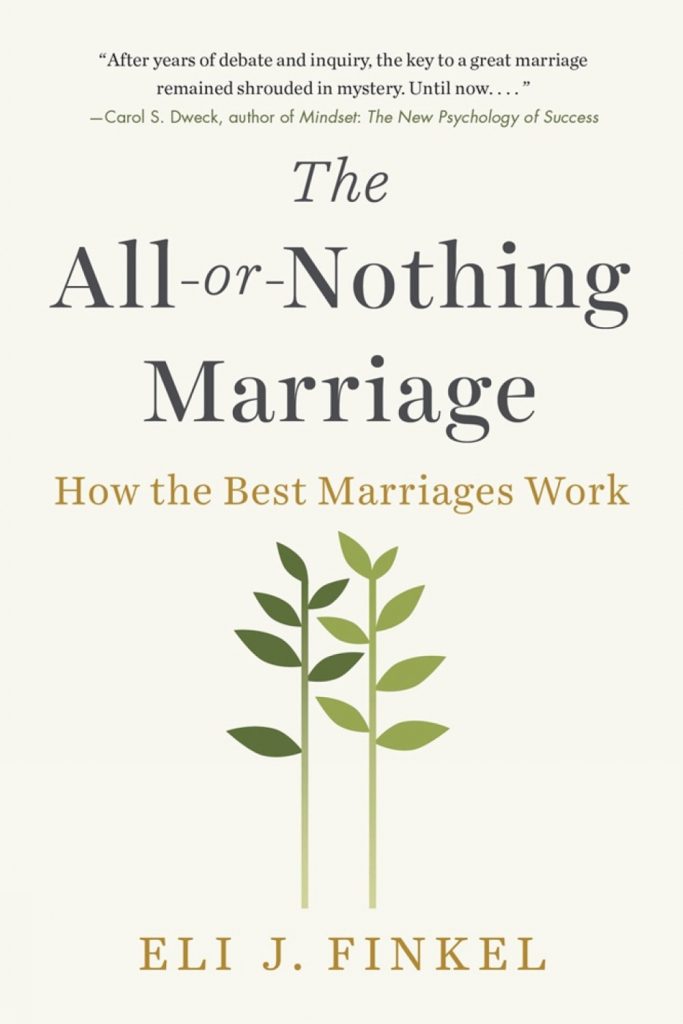
For me personally, Eli J. Finkel’s book “All-or-Nothing Marriage: How the Best Marriages Work” became the book of the year. I would definitely recommend it to my colleagues and to all those who are looking for ways to enjoy their marriages more. It is insightful, practical, and easy to read.
Here are some of the key points that I wanted to share.
There are two seemingly conflictual research findings:
- an average marriage is getting worse (why?)
- the effect of good/bad marriage is stronger than ever on the quality of life. Relationship quality is twice as important today as they were a couple of generations ago. Why?
If we want to give answers to these why’s, then psychology is not enough, we have to look at the history, economics, and sociology of marriage.
Long story short, the unions have moved from the pragmatic ones, to love-based, and then to self-expression ones. It is not enough for us just to be married, and be in love, we also want our marriage to be the extension of who we are. (Who are we anyways?) No, not just who we are, but the best version of ourselves, we want to feel that we are growing together with our partner.
In previous “eras” of marriage the roles were clear and rigid. At some point it was ‘decided that women needed to stay at home because it was “best” for economic production and safety, but staying at home also meant lack of insight into each others’ worlds, something which is a big barrier for helping someone to grow. Traditional marriage lacks the capacity to promote self-actualisation.
It looks like the institution of marriage has been (or trying to) moving up the pyramid of Maslow’s hierarchy of needs. The first marriages were about providing physical needs and safety, then about love, belonging, and then, on the top of the previous 4 demands from marriage we added up self-actualisation. And we require all of that from one person. Why? Because there seems to be very little people left to help us – we are lonelier than ever. We live in urban cultures with little space for maintaining friendships and relationships with relatives. And the research shows that couples who manage to maintain these relationships are generally happier, for they have wider range of the investment that we will discuss later here.
No wonder in America, 40–50% of marriages end in divorce. One partner can barely fulfil these demands, unless… he/she/they follow one of three strategies, or a combination of them:
It all comes down to supply (what a marriage can it realistically provide for these particular partners) and demand (what we can realistically ask from marriage of these particular partners). In short, we can either invest more or ask less.
Investing more (Increase supply): means developing your own skills: like communication, sex, etc. According to sex therapist Dan Savage, being ‘good’ in bed means being skilled, generous, and adventurous. Which one or a combination of which would you like to improve?
When you decrease the demand, keep in mind that there is no shame in asking less from yourself and your partners. Nobody can offer excellent supply all the time. Keep an eye on the outer and inner circumstances.
The third strategy is about enhancing mystery in the relationship, which is not about travelling to new places, but looking with new eyes (buy yourself some time in the period of crisis). The author suggests 8 different ways of doing so, and my favourite one is called “external temporary locus of causation”. It means making it a habit of explaining your partner’s negative behaviour not by his/her/their “awful” character, but by temporary external conditions, like “he got stuck in traffic today”. And vice versa for the positive acts from a partner: you should strive to explain them by stable internal conditions, like his kind character, etc.
Two more points: research shows that richer marriages do better, stay longer and more fulfilled (and there are different potential reasons for that). But that finding apples to those partners who are from the same socio-economic class and both are working. The cross-socioeconomic marriages are less and less common.
Open relationships? The research did not find any significant difference of happiness level between the couples who are in monogamous and consensual non-monogamous marriages. However, people who score high in socio-sexuality (ability to have sex without emotional attachment), tend to be happier in consensual non-monogamy. How high do you score?
To sum up, the key to having the best marriage is to discuss what, when, and how much you are going to invest together and individually and if you decide to decrease, then what precisely will it be and for how long?
Best marriages today are way better than the best marriages in the past, but they require much more continuous effort than they used to. Do you have what it takes and are you willing to work?
